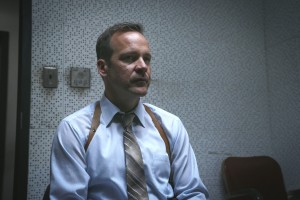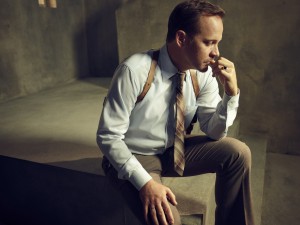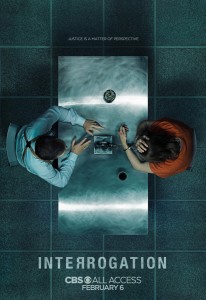
Peter Sarsgaard as Det. David Russell in INTERROGATION – Season 1- “Eric Fisher” | ©2019 CBS Interactive/Ursula Coyote
INTERROGATION is streaming all ten episodes of its first season on CBS All-Access. Unlike most narrative series, apart from the first and last episodes, INTERROGATION is designed by its creators, John Mankiewicz and Anders Weidemann, to be watched in any order the viewer wants.
Based on a real criminal investigation, INTERROGATION follows a Los Angeles-area murder case that stretches from 1983 to 2009. Kyle Gallner stars as prime suspect Eric Fisher, accused at age seventeen of killing his mother. In real life, cold case detectives look at files in whatever order they choose, not necessarily going in chronological order. Viewers are invited to apply the same technique so that they can piece the evidence together for themselves.
Peter Sarsgaard plays LAPD homicide detective David Russell, who is quickly convinced of Eric’s guilt and thereafter leaves no stone unturned in his efforts to have Eric convicted and locked up.
Sarsgaard, originally from Illinois, played real-life killer John Lotter in BOYS DON’T CRY, opposite Hilary Swank (who won an Oscar for her performance). Sarsgaard’s other films include roles in THE SALTON SEA, K-19: THE WIDOWMAKER, SHATTERED GLASS, GARDEN STATE, KINSEY, JARHEAD, ORPHAN, LOVELACE, EXPERIMENTER, BLACK MASS, and THE MAGNIFICENT SEVEN. His television work includes THE KILLING, THE SLAP, WORMWOOD, and THE LOOMING TOWER.
ASSIGNMENT X: Is Detective David Russell literally a real person, or is he a character based on a real person?
PETER SARSGAARD: All the things in this are “inspired by,” I think is the phrase, actual events.
AX: Did you speak to the person who is the inspiration for Detective Russell?
SARSGAARD: I didn’t, but I did speak to several homicide detectives in great detail, and they were also around [during production]. So it’s interesting. It’s interesting to be somebody who comes in when [the murder] is still fresh, but there’s still some kind of running around after the people. There’s something about that that felt very interesting in terms of acting for me. Because that’s sort of what it feels like to be an actor. You’re trying to create a sense that everything is really still fresh, in the present, and alive, and trying to piece together a narrative based off of lots of disparate things. I remember one of the first things that I told everybody I wanted was a really nice pair of shoes. I was like, “I really love the idea of wearing a nice pair of shoes, and walking through a crime scene, and what that would feel like.” So obviously, I wasn’t thinking much about anybody that this was inspired by, even when I was doing that. I wasn’t thinking, “Oh, because So-and-So wore a nice pair of shoes …” I really spent, I would say, zero time thinking about anyone else other than the story that we were trying to create, what would serve that best, and what would serve me best.
AX: What does wearing a nice pair of shoes to a crime scene get you – awareness of where you’re putting your feet, so they don’t get dirty?
SARSGAARD: That’s right. [laughs] I sort of liked the idea – it’s like working some job where you would think, “Well, you shouldn’t wear your nicest whatever,” but playing someone who still had some sense of vanity, that they were like, “No, I’m just going to be careful.” Compared to a lot of other roles, I did think about what I was wearing a lot more in [INTERROGATION].
AX: Well, if you read Michael Connelly, apparently real police don’t like to wear their nice clothes to investigate a murder scene if the body’s been sitting there any amount of time, because in addition to anything they might step in, the smell sticks to their clothing …
SARSGAARD: Yeah. And they all told me that when I told them I was doing this. I guess as an actor, some of the time you look for conflict wherever you can find it.
AX: The episodes seem to be different, depending on who’s telling the story. Do you think the characters change, depending on who’s telling the story?
SARSGAARD: That’s an interesting question. I don’t think it’s even reliant upon an actor for that to happen. I think just by editing, things change. I remember when I did BOYS DON’T CRY, for example, [the film’s director] Kim Peirce used to talk about how she could make that character [played by Sarsgaard] extremely likable, or extremely unlikable, and then she decided to cut it so that he was somewhere in the middle, and a little bit gray, And I think those kinds of decisions, about the way you are perceived through the point of view that we are in, come from the editing and have very little to do with the way I play it. [In INTERROGATION] I don’t go, “Oh, I’m in Kyle’s perspective.” I don’t do anything different. I just behave as I would. The stories were different, though. They emphasize different parts of my life. So at work, I’m one person, and at home, I’m a different person.
AX: Also, your character ages twenty years through the course of INTERROGATION …
SARSGAARD: Yeah. Which was really kind of nice, the way that they did that. That was a great [makeup] team. Because we did very subtle things. We had a little bit of weight gain underneath my chin. And the other thing is to hide the wrinkles when you’re young, and show them when you’re older. Because I didn’t age a lot older than I am. So some of the time, we took a pregnancy belly and flipped it backwards and I wore that as a belly during part of it. I’d be like, “But I’m roughly this age, why do I have to be fatter than I am?” [laughs]

Peter Sarsgaard as Det. David Russell in INTERROGATION – Season 1| ©2019 CBS Interactive/James Dimmock
AX: [laughs] They’re like, “Because you’re the weight you are in real life when you’re playing younger, so we have to add some for when you’re older”?
SARSGAARD: We’re trying to create change.
AX: Speaking of BOYS DON’T CRY, sometimes you play characters, as in that film, who are coming from a place of ignorance, for want of a better word. Detective Russell may or may not be wrong, but he is coming from a place of great knowledge about a great many things …
SARSGAARD: And ambition. And I think that the thing that is pulling me along a lot of the time is ambition, wanting to be excellent in a job where it’s difficult to separate yourself, to show that you’re a person that has a great ability to figure things out, based off of very little, sometimes.
AX: Do you empathize with Russell in that respect?
SARSGAARD: Yeah, definitely. I think ambition is one of the things that corrupts us all at some point. I mean, obviously, a healthy amount is necessary to get through the difficulty of, for instance, learning how to play a violin, right? Why else are you going to sit there every day and have it sound horrible in your ear? Because you have the ambition to have it sound nice, and maybe even play it in front of people. The same thing is true for many jobs. But unfortunately, with a homicide detective, until you’re doing it, it’s all pretend, and then when you’re doing it, everyone’s life hangs in the balance.
AX: Is there a reason for Russell’s particular animosity towards Eric Fisher, or is it just once he’s got the win, he can’t let go of the win?
SARSGAARD: Well, there’s that. There’s cognitive dissonance, right? Which is all over our world today, which is that nobody seems to be able to admit when they did something wrong. They say, “Well, what about you? You did that,” if they’re even going to say anything [laughs]. Which is not relevant. But I think there’s also a sense of it feeling personal to all of us, and deeply upsetting, the nature of this crime. And there’s a fair amount of evidence, it’s not like I’m pulling it off of nothing. Where the evidence doesn’t quite match up, or where I wish there were something, the really wildly destructive nature of [the murder] can make you see things that are not necessarily there. I remember one of these homicide detectives at one point telling me, I was talking to him about the script, and he said, “Well, just because he gets proven innocent doesn’t mean that he didn’t do it.” Just because the law is different than reality. In the law, is there enough to prove beyond a reasonable doubt? Well, just because you can’t prove something beyond a reasonable doubt doesn’t mean somebody didn’t do it. So I think there is that difference that is niggling at him, and it’s because a boy killed his mother, it’s intense.
AX: Is it more difficult to play somebody who is very knowledgeable whom you identify with, than somebody who’s …
SARSGAARD: Just ignorant?
AX: Yeah, like the character in BOYS DON’T CRY.
SARSGAARD: The character in BOYS DON’T CRY felt just very animal to me, so it was actually really fun to play, because nothing ever went through my brain, do you know what I mean? I was talking to someone about this cat that I have that’s dying, and he’s just so needy, and they were like, “Yeah, because people when they’re dying, there’s still an element of like, ‘I don’t want to put you out. But a cat when it’s dying is like, ‘I need it, and the food, and you,’ and won’t get off of you.” And I think that’s what the character of John Lotter felt like to me, he felt like an animal that was sinking, and was just grabbing at anything. Now [Russell], yeah, everything does go through his mind a bit more. I wouldn’t call him an intellectual, but he’s thinking about it a lot more. Yeah, it is more difficult. The brain gets in the way of acting a lot of the time.
AX: I’m so sorry about your cat.
SARSGAARD: I’ve had this cat for almost twenty years.
AX: Congratulations. It’s a real accomplishment to have a cat reach that age. Do you ever look at animals for any kind of acting inspiration?
SARSGAARD: All the time. Many actors do. That’s a thing you do in acting school. I’d say there have been characters where I only thought about animals [laughs].
AX: Has your cat inspired anything?
SARSGAARD: Probably will in the future. I had a dog named Heather that I thought a lot about. They really reminded of me of the sheepdog, the one from the [Warner Brothers Looney Toons] cartoon. “I’m gonna love him, and kiss him, and call George.” Remember that? It was a chicken hawk and a sheepdog. And I definitely thought about that dog when I was playing Jimmy, this character I played in THE SALTON SEA, who gets a tattoo of Val Kilmer on his arm. That was a very loving character, it’s probably the most loving character I’ve ever played, but an imbecile in a lot of ways. Jimmy was a drug addict, but he was a joyful, sweet drug addict.
AX: INTERROGATION can be, and is even expected to be, watched out of sequence. But in filmmaking, things are often shot out of sequence, even when they’re ultimate shown in sequence, so does the storytelling style of INTERROGATION faze you at all?
SARSGAARD: Yeah. Because I’m a storyteller, and I don’t know what story anybody’s following at that moment, because they’re going to be watching it in different orders. So I don’t know the relative importance of anything, do you know what I mean? When you’re telling a normal story, “This happened, and then this happened, and then this happened.” BOYS DON’T CRY, for example. Have I killed her yet, or not killed her yet? In this, I don’t know. I don’t know what order anybody’s [seeing the events in]. Has this happened yet, or has this happened yet? I don’t know. So you pay attention to other things in storytelling.
AX: What do you pay attention to?
SARSGAARD: Character stuff and relationships between other people. And I would know the whole script, although it was frequently being written as we went. But I would know the basic outline of it, so I my relationship with Kyle is one that I obviously kept track of. My relationship with my wife, I kept track of. My relationship with my father. I’d be like, “How much has my father lost his mind at this point, or not? How much of my daily routine is spent taking care of him, or not?”
AX: Russell also has a daughter who grows up over the course of INTERROGATION. How is it playing the father of a young woman?
SARSGAARD: Well, I’ve got two daughters, so that feels totally normal to me. I mean, that was probably the part of the story that was the easiest for me. I have a scene with her where she’s very upset. When your kid is very upset, there are a lot of things you would think of doing that you would never [normally do]. I actually have some sympathy for parents that do outrageously stupid things in the name of their children. Your children will wind you up in a way that no one else will. Any of these parents that pay outrageous sums of money to get their kids into schools that they have no right going to, I understand where that comes from. I still think that’s horrible – it’s not horrible like killing someone is horrible [laughs]. Your kids wind you up. You also just look at the world, and you think, “I have to put them first, they have to be first in line, I have to find a way to get them first. Or if something possibly bad happens, I’ve got to [fix it].”
AX: Do you have any other projects going on we should know about?
SARSGAARD: I’m about to do THE BATMAN [playing D.A. Gil Colson]. And then I have a Barry Levinson movie I did, HARRY HAFT, and an Agnieszka Holland movie I did [MR. JONES] coming up. What else? I’m doing a movie that my wife [Maggie Gyllenhaal] is directing, based on an Elena Ferrante novel, THE LOST DAUGHTER, with Olivia Colman and Jessie Buckley and Dakota Johnson.
AX: And what would you most like people to know about INTERROGATION?
SARSGAARD: I think that it’s a unique experience. That idea, that your understanding of what the truth is and what happened could have something to do with the way that you perceived it and the order in which you perceived it, and your point of view, your entry point, is an important thing to take away in the world we live in right now. And I think it would be interesting within a given household for people to experiment with having different entry points, watching it separately, and seeing if the story seems the same to them. Because that is the way that our reality gets distorted.
This interview was conducted during CBS All-Access’s portion of the Winter 2020 Television Critics Association (TCA) press tour.
Related: Exclusive Interview with INTERROGATION creators John Mankiewicz and Anders Weidemann on Season 1
Follow us on Twitter at ASSIGNMENT X
Like us on Facebook at ASSIGNMENT X
Article Source: Assignment X
Article: Exclusive Interview with INTERROGATION actor Peter Sarsgaard on Season 1 of the CBS All-Access series
Related Posts:












